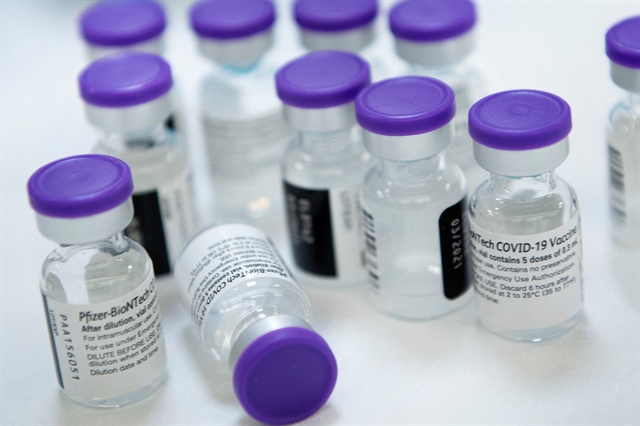 World
World


|
| Pfizer/BioNTech vaccine. — AFP/VNA Photo |
WASHINGTON — President Joe Biden outlined his plan on Thursday for the first of 80 million coronavirus vaccine doses that the US will distribute globally before July, with 75 per cent of shots disbursed via the COVAX scheme.
In a fact sheet, the White House said that for the doses shared through COVAX, Washington would prioritize countries in Latin America and the Caribbean, South and Southeast Asia, and Africa as it aims to help stave off fresh surges of infections.
"We are sharing these doses not to secure favours or extract concessions," Biden said in a statement.
"We are sharing these vaccines to save lives and to lead the world in bringing an end to the pandemic, with the power of our example and with our values."
Earlier this year, Biden pledged to export 60 million Covid-19 vaccine doses to countries around the world – then bumped it up to 80 million.
The commitment came amid pressure from other governments to use the United States' large vaccine surplus to help struggling nations now that significant progress has been made in rolling out vaccinations at home.
"The process to export the first 25 million is underway," White House Covid-19 response coordinator Jeff Zients told reporters.
"We will deliver on the president's commitment of 80 million doses by the end of June."
He said the first tranche is coming from the federal supply of doses and will be comprised of a combination of the three vaccines with current US emergency use authorisation: Johnson & Johnson, Moderna and Pfizer/BioNTech.
A vaccine created by AstraZeneca has yet to earn US authorisation but is in use elsewhere.
COVAX is an international scheme cofounded by the World Health Organisation (WHO) and the vaccine alliance Gavi intended to get enough vaccines for 30 per cent of the population in 92 of the poorest participating territories – 20 per cent in India – with donors covering the cost.
Gavi quickly welcomed Biden's step, with its chief executive Seth Berkley saying, "This announcement allows us to quickly get more doses to countries in a strained global supply climate" and move towards ending the acute phase of the pandemic.
WHO chief Tedros Adhanom Ghebreyesus weighed in to say he was "very appreciative" of the US move.
'Flexibility'
According to the US plan, of its first 25 million doses, about seven million are allocated for Asia, especially India, Nepal, Bangladesh, Afghanistan and Việt Nam.
Some six million are allocated to nations in South and Central America and the Caribbean, including Brazil, Argentina, Colombia, Costa Rica and Haiti.
Five million are reserved for Africa and will be distributed in coordination with the African Union, National Security Advisor Jake Sullivan said.
The remaining six million doses will be shared directly with countries experiencing surges or that are in crisis, as well as with neighbours Canada and Mexico and "partner recipients" such as South Korea, Ukraine, Gaza and Iraq.
Sullivan stressed the United States wants to "retain some flexibility" about allocating doses outside the Covax formula as necessary.
"As we draw on the experience of distributing the vaccine doses announced today, we will have more details to provide about how future doses will be shared," Biden said.
India expressed gratitude, with Prime Minister Narendra Modi tweeting he spoke with US Vice President Kamala Harris after the announcement.
"I deeply appreciate the assurance of vaccine supplies to India as part of the US Strategy for Global Vaccine Sharing," Modi said.
Covax was set up to ensure equitable distribution of vaccines, particularly to low-income countries.
Covax has already delivered nearly 80 million doses to 127 territories, with AstraZeneca shots making up 97 per cent of doses supplied so far – the rest being Pfizer-BioNTech. — AFP